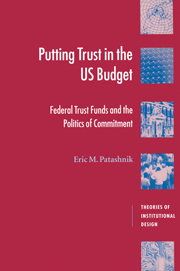Book contents
- Frontmatter
- Contents
- List of figures
- List of tables
- Preface
- 1 Introduction: trust funds and the politics of commitment
- 2 Political transaction costs, feedback effects, and policy credibility
- 3 Trust fund taxes vs. general fund taxes
- 4 Social Security
- 5 Medicare
- 6 Highways
- 7 Airports
- 8 Superfund
- 9 Barriers to trust fund adoption: the failed cases of energy security and lead abatement
- 10 Conclusions: the structure and normative challenges of promise-keeping
- Bibliography
- Index
6 - Highways
Published online by Cambridge University Press: 22 September 2009
- Frontmatter
- Contents
- List of figures
- List of tables
- Preface
- 1 Introduction: trust funds and the politics of commitment
- 2 Political transaction costs, feedback effects, and policy credibility
- 3 Trust fund taxes vs. general fund taxes
- 4 Social Security
- 5 Medicare
- 6 Highways
- 7 Airports
- 8 Superfund
- 9 Barriers to trust fund adoption: the failed cases of energy security and lead abatement
- 10 Conclusions: the structure and normative challenges of promise-keeping
- Bibliography
- Index
Summary
In a sense, the creation of the Highway Trust Fund in 1956 represented a departure from existing patterns of institutional design. Previously, use of the trust fund device had been restricted almost entirely to public pension and social insurance programs. By their very nature, such programs involve long-term commitments to specific individuals about their personal economic security. By contrast, the Highway Trust Fund finances an infrastructure program providing transportation benefits to a broad-based group (motorists), with spillover benefits to geographic areas (states) and service providers (highway contractors). Yet the Highway Trust Fund, like the social insurance trust funds, was designed to promote policy durability. The trust fund's adoption gave highway interests procedural and symbolic advantages over other lobbies in the yearly scramble for fiscal support. But these advantages have also made the Highway Trust Fund a conspicuous target for highway opponents and institutional budget guardians, forcing the highway lobby to defend the trust fund against wholesale modification.
Rationales for trust fund and earmarked taxes
In mid 1950s America, constructing a transcontinental highway system was a policy idea whose time had come. A “surge of media articles” discussed problems in US roadways and the need to improve automotive safety. The main political barrier to the project was money. Congress first authorized construction of a superhighway network in 1944. But interstate construction was vastly more expensive than traditional federal-aid highway projects and Congress offered states no economic incentive to begin the work beyond its normal 50–50 matching grants.
- Type
- Chapter
- Information
- Putting Trust in the US BudgetFederal Trust Funds and the Politics of Commitment, pp. 113 - 134Publisher: Cambridge University PressPrint publication year: 2000

